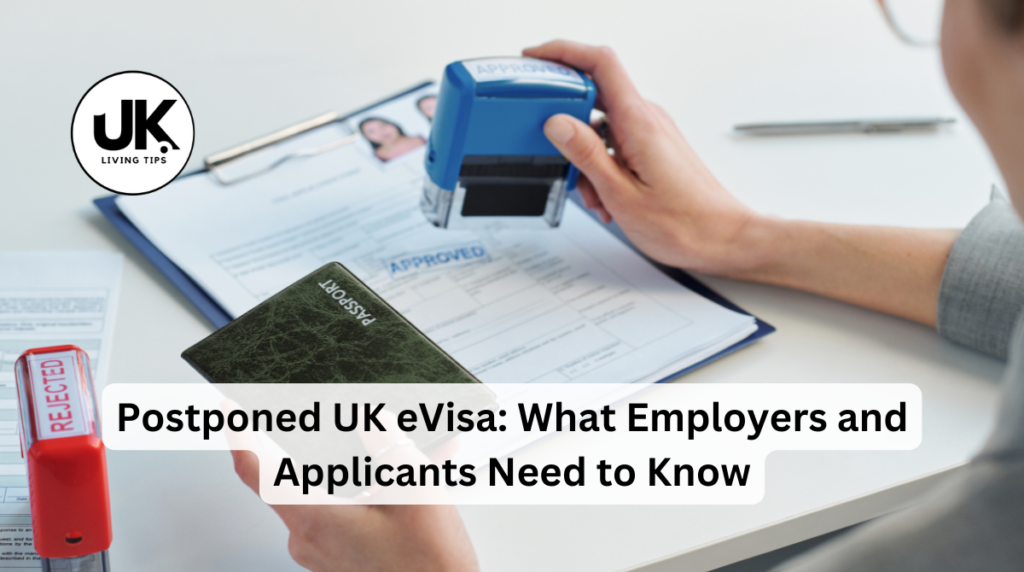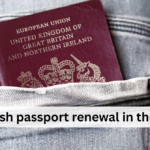Welcome to UK Living Tips, in this Article we will talk about the highly anticipated UK eVisa system, designed to streamline the entry process for visitors from numerous countries, which has faced unexpected delays. The planned transition deadline has been postponed, leaving businesses and individuals grappling with uncertainty regarding travel plans and immigration compliance. This article explores the reasons behind the delay, its impact on employers and right-to-work checks, and what the future holds for the UK’s digital immigration landscape.
READ ALSO: How to Appeals on UK Visa Refusal: Your Guide in 2025
Overview
Postponed UK eVisa: A Necessary Setback?
The UK government’s ambitious plan to implement a comprehensive eVisa system aimed to modernise its immigration procedures, making the process quicker, simpler, and more efficient for both applicants and border officials. The original timeline envisioned a phased rollout, with a target date for full implementation set to 31 March 2025. However, the Home Office has announced a postponement, citing the need for further development and testing to ensure the system operates smoothly and securely.
While the exact reasons behind the delay haven’t been fully disclosed, industry experts suggest that the complexity of integrating existing systems with the new eVisa platform, along with the need to rigorously test its security features against potential vulnerabilities, likely contributed to the postponement. Building a robust and reliable system is paramount, especially given the sensitive nature of immigration data and the potential consequences of system failures. The government’s decision to prioritise stability and accuracy over a strict adherence to the initial timeline reflects a responsible approach to managing such a significant technological undertaking.
The postponement creates uncertainty, particularly for businesses and individuals who had planned their travel and employment arrangements based on the original timeline. This uncertainty necessitates proactive communication and planning to mitigate potential disruptions.
Adoption of the New UK eVisa System: A Phased Approach
The UK government’s approach to implementing the eVisa system is likely to involve a phased rollout. Instead of a sudden, nationwide implementation, we can expect a gradual introduction, starting perhaps with pilot programs involving specific nationalities or limited functionalities. This phased approach allows for continuous testing and refinement, minimizing the risk of widespread disruption. Feedback gathered during the pilot phases will be crucial in identifying and addressing any remaining bugs or inefficiencies before a full-scale launch.
The ongoing development work will focus on enhancing the system’s user-friendliness, improving security measures, and ensuring seamless integration with existing databases and other government systems. This meticulous approach is understandable given the system’s vital role in border control and immigration management.
Impact on Employers and Right to Work Checks
The delay in the eVisa system’s implementation has significant implications for employers, particularly those who rely on employing overseas workers. Right-to-work checks, a crucial part of the UK’s employment laws, are designed to ensure employers only hire individuals legally entitled to work in the country. The current system often involves manual checks of physical documents, a process that can be time-consuming and administratively complex.
With the new eVisa system, employers were expecting a streamlined process, with potentially digital verification of applicants’ right to work. However, the delay means employers will continue to rely on the existing methods for the foreseeable future. This necessitates ongoing vigilance and adherence to current right-to-work check procedures to avoid any legal repercussions.
The continued reliance on paper-based documentation could potentially lead to delays in recruitment processes and increase administrative burden on HR departments. Employers need to proactively communicate with their recruitment teams and ensure that all staff involved in recruitment and compliance are fully aware of the current procedures and any updates provided by the Home Office.
The government needs to ensure clear and timely communication to employers about the status of the eVisa system and its impact on right-to-work checks. Providing clear guidelines and potentially temporary solutions to ease the burden on businesses during this transition period would be beneficial.
Addressing the Concerns and Looking Ahead

The postponement of the UK eVisa system’s implementation is a setback, but it presents an opportunity to ensure the system is robust, secure, and efficient upon its launch. Open communication from the Home Office is crucial to managing expectations and minimizing disruption. Regular updates on the progress of the system, including revised timelines and the planned rollout phases, will help businesses and individuals plan effectively.
Furthermore, the government needs to consider the potential impact of the delay on businesses and offer support to navigate the complexities of right-to-work checks during the transition period. This might involve providing additional resources, training materials, or simplifying the existing procedures temporarily.
The long-term benefits of a modernized eVisa system are undeniable. A streamlined process will enhance efficiency, improve the visitor experience, and strengthen border security. The delay, though frustrating, allows for a more comprehensive and reliable system to be delivered.
FAQ
Q: When will the UK eVisa system be implemented?
A: The Home Office has postponed the original deadline. A new timeline will be announced once the system is fully tested and ready for deployment. Check the official UK government website for the latest updates.
Q: How will the delay impact my travel plans?
A: If you’re planning to visit the UK, check the latest visa requirements on the official government website. You may still need to apply for a standard visa depending on your nationality.
Q: What are the benefits of the eVisa system once it’s implemented?
A: The eVisa system aims to simplify the visa application process, improve efficiency, enhance security, and provide a more convenient experience for both applicants and border officials.
Q: Where can I find more information about the UK eVisa system?
A: The official UK government website for immigration and visas is the best source of up-to-date information.
Conclusion:
The delay in implementing the UK eVisa system is a temporary setback. While causing uncertainty, it ultimately allows for the creation of a more robust and secure system. Clear communication, proactive planning, and government support are important to mitigating the impact on businesses and travelers. The long-term benefits of a streamlined, digital immigration process will far outweigh the short-term inconvenience caused by the delay. Continued engagement with the Home Office’s updates will be vital for all stakeholders as the system develops.



